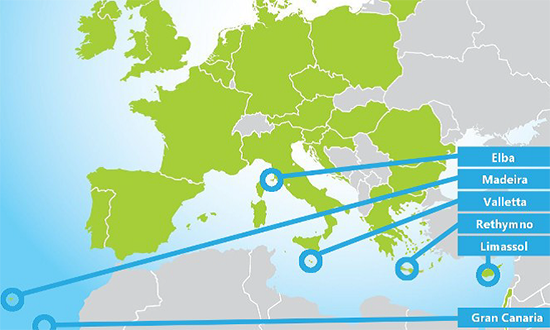United States-European Commission Urban Freight Twinning Initiative: Compendium of Project Summaries
| ||||
| Pilot | Research | Europe |
CIVITAS DESTINATIONS is one of the three biggest projects on sustainable mobility recently funded by the European Union. The project involves 30 partners from 10 European countries and 4 cities in China. The main objective is to achieve sustainable mobility for residents and tourists by working toward measures and innovative solutions in the following sectors: car-independent lifestyle; clean fuels and vehicles, collective and flexible public transport; demand management; integrated sustainable mobility plan; innovative crowd-sourcing and public involvement tools; intelligent transport systems for access control and criteria; and urban freight distribution and city logistics.

CIVITAS DESTINATIONS pilot locations in Europe.
Source: CIVITAS DESTINATIONS.
Research, Pilot, and Policy
September 2016 - September 2020
Five popular European tourist destinations: Madeira, Portugal; Crete, Greece; Gran Canarias, Spain; Cyprus; and Elba, Italy
Giorgio Ambrosino
Transportation Planner IV
DESTINATIONS Innovation and ITS Lead; Elba Site Manager
MemEx, Italy
+39 0586 211646
Giorgio.Ambrosino@memexitaly.it
Each of the six CIVITAS DESTINATIONS cities will develop an integrated Sustainable Urban Logistics Plan (SULP) and a general Mobility Plan (SUMP-Sustainable Urban Mobility Plan) following a common methodology set up at the European Union level (IEE-ENCLOSE project) to address the various aspects of urban freight distribution. Additionally, these cities will begin to utilize different measures/services concerning last and first miles, delivery with Enhanced Environmentally Friendly vehicles (i.e., vehicles that comply with the most stringent exhaust emissions standard), special services (hotel laundry services), and new access regulations set by the local authorities in favor of low-carbon delivery schemes.
Local and regional authorities and chambers of commerce are directly involved in the project. They are responsible for all the site measures implementation and evaluation. Additional partners include university and research institutes (focusing on innovative solutions) and transport operators and consultancy companies (focusing on the implementation of specific services for last-mile delivery and schemes at site level). The local authority will serve as the facilitator for the various transport operators and shop keeper associations in order to:
|
United States Department of Transportation - Federal Highway Administration |
||